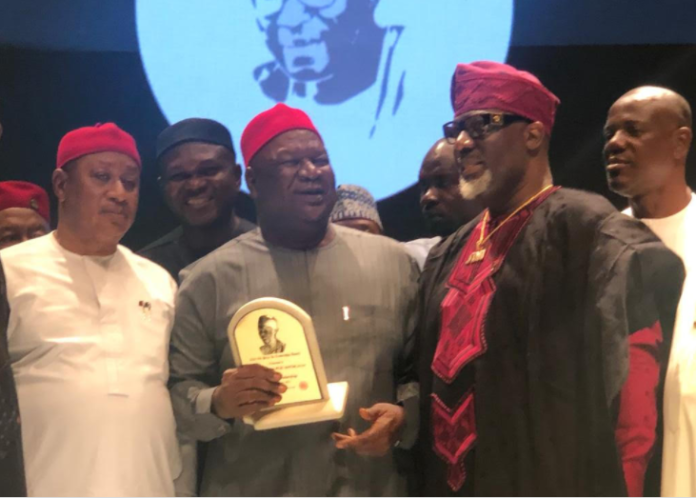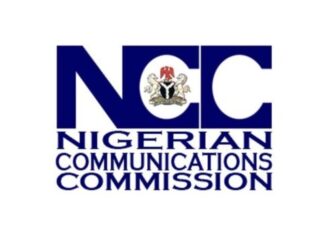Anyim seeks a leader to harness resources for 21st Century challenges
By Jeph Ajobaju, Chief Copy Editor
Nigeria needs a visionary leader, who is both educated and capable, to harness communication, technology, and the creativity of youth for the country to fully benefit from the windfall of the Fourth Industrial Revolution now upon the world.
This is former Senate President Anyim Pius Anyim’s advocacy, with a lament over the wastage of resources God bestowed on “Nigeria [which] was founded on the principle of unity in diversity, but we are now more divided than ever in our history.
“Around the world our image has shifted from the giant of Africa to what some say is the poverty capital of the world ….
“We need leadership that will change these challenges to a success story. Such leadership must have vision and capacity, be determined and above all be inclusive.”
Anyim spoke on Sunday on behalf of fellow recipients of the Year 2020 Zik Prize in Leadership at a ceremony held at Eko Hotel & Suites, Victoria Island, Lagos.
Award recipients
Apart from Anyim, the other awardees are
- Babajide Sanwo-Olu (Lagos State Governor)
- Abdullahi Sule (Nasarawa State Governor)
- Akinwumi Adesina (African Development Bank (AfDB) President)
- Mele Kolo Kyari (Nigerian National Petroleum Corporation (NNPC) Managing Director)
- Ekaette Akpabio (former Akwa Ibom State First Lady now Family Life Enhancement Initiative (FLEI) Chairperson
- Bashir Jamoh (Nigerian Maritime Administration and Safety Agency (NIMASA) Director General)
- Olorunnimbe Mamora (Minister of State for Health)
- Urum Eke (FBN Holdings Group Managing Director)
- Uche Orji (Nigeria Sovereign Investment Authority (NSIA) Chief Executive Officer)
__________________________________________________________________
Related article:
Obiano commiserates with Azikiwe’s family
__________________________________________________________________
Zik’s outstanding qualities
The award, now in its 26th year, was instituted by the Public Policy Research and Analysis Centre (PPRAC) in honour of Nnamdi Azikiwe, one of the key figures who fought for Nigeria’s independence and became its first president in 1960.
Zik, as he was popularly called, died in 1996 at the age of 91.
“To be associated with the name Zik is a priceless honour to any Nigerian,” Anyim stressed, because he “exemplified principled, committed and focused leadership. Zik was an outstanding and charismatic leader.”
He described Zik as a passionate patriot, an unapologetic nationalist, a relentless defender of justice and an ardent believer in the unity of Nigeria.
“These qualities stood Zik and his fellow nationalists out as leaders who rose to the challenges of their time, who fought with all they had, liberated us from the shackles of colonialism and laid a solid foundation for a nation with every potential to be a strong and respected voice among the comity of nations.
“Nigeria now, more than ever before, is in urgent need of men and women who will think, act and live like Zik and his fellow nationalists.”
Tribute to other nationalists
Anyim equally paid tribute to other nationalists such as Herbert Macaulay, Abubakar Tafawa Balewa, Ahmadu Bello, Obafemi Awolowo, Michael Okpara, Anthony Enahoro, Joseph Tarka, Harold Dappa-Biriye, and Aminu Kano.
He commended them for “the huge sacrifices they made to secure for us a free and independent nation. They were guided in their actions by what was best for the citizens of Nigeria. They provided leadership that inspired their followers.
“They faced daunting challenges but they overcame those challenges and achieved their objectives because of their commitment to building our nation.
“They understood that nation building is an arduous task. It calls for sacrifices, patience, tolerance, accommodation and consensus building. We need to imbibe the spirit that guided our leaders in the past.”
A changing world
The world is changing, Anyim reiterated, saying Nigeria’s problems are now “monumental and more complex” – therefore, the demand of leadership in the present-day Nigeria “has become more daunting.”
He cited Nigerians population that has risen from about 45 million in 1960 to over 200 million in 2020 with most of the population in the youthful bracket.
“Our economy has moved from the boom of the 1960s and 1970s to cycles of stunted growth and recession in the last decade. Our educational institutions have moved from the best rankings in the 1960s to mediocre positions in the 2020s.
“Our Naira has depreciated from 65 kobo to a dollar in the early 1980s to the present N568 to a dollar in 2021. Our labour market has moved from employment of choice in the 1970s to crises of underemployment and unemployment in the 2020s.
“In agriculture we have gone from a net exporter of food and cash crops to a nation of food insecurity and import dependence.
“Nigeria was founded on the principle of unity in diversity, but we are now more divided than ever in our history. Most of us will still remember when we were our brothers’ keeper, but today danger lurks at every corner, nobody is safe anywhere.
“Around the world our image has shifted from the giant of Africa to what some say is the poverty capital of the world ….
“The leadership approach that will cope with these challenges must be beyond the usual. We need leadership that will change these challenges to a success story. Such leadership must have vision and capacity, be determined and above all be inclusive.”
Anyim warned that the challenges of leadership will be much more daunting as we move towards the second quarter of the 21st Century (2026 – 2050) due to the effects of the Fourth Industrial Revolution popularly known as Industry 4.0.
He said it has been described as “the next phase of dramatic technological expansion and social change”.
He quoted Klaus Schwab, founder and Executive Chairman of the World Economic Forum (WEF), who said: ‘“The possibilities of billions of people connected by mobile devices, with unprecedented processing power, storage capacity, and access to knowledge are unlimited.
‘“And these possibilities will be multiplied by emerging technology breakthroughs in fields such as artificial intelligence, robotics, the internet of things, autonomous vehicles, 3-D printing, nanotechnology, biotechnology, material science, energy storage and quantum computing.’”
Challenges ahead
Anyim urged fellow Nigerians to note some of the implications of the Fourth Industrial Revolution for the future:
- “As communication to millions of people across boundaries becomes common place, at little or no cost, every individual, rich or poor, illiterate or educated, would have the means to influence, challenge, stimulate or expose situations around them.
“Accordingly, civic engagement of the citizens would become inescapable for leaders in the 2nd quarter of the 21st Century.
- “Scientists will continue to push the boundaries of technology in a bid to replace most human endeavour with machine operations, cutting across industries and human operations – (manufacturing, oil and gas, space travel, transportation, medicine, agriculture, sports, education, communication, construction, power supplies, military, banking, et cetera).
“We are certain to experience unprecedented enhancement of the existing technologies, e.g., from electric vehicles to self-driving and self-assisted parking cars, from smartphones to smart homes, from cyberknife to robotics surgery, space travel to space colonisation, from smart city to intelligent roads et cetera.
“The world no doubt will reach for an unprecedented level in technological expansion in the 2nd quarter of the 21st Century.
- “In the next 25 years, oil companies and oil explorations will continue to phase out. This will certainly depress economies that are oil dependent with consequential social and economic effects.
“On the effect of the 4th Industrial Revolution on our existence, again, Klaus Schwab captured it thus: ‘“We stand on the brink of a technological revolution that will fundamentally alter the way we live, work, and relate to one another.
‘“In its scale, scope, and complexity, the transformation will be unlike anything humankind has experienced before.
‘“We do not yet know just how it will unfold, but one thing is clear, the response to it must be integrated and comprehensive, involving all stakeholders of the global polity, from the public and private sectors to academia and civil society.’
“In the years ahead, for Nigeria to survive and thrive, we must have peace at home and respect abroad.
“For that, we need leadership that understands the challenges, the imperatives and concomitant of the 4th Industrial Revolution. We need leaders that must connect and engage with the people especially the youth.
“Such leaders must place the youth at the centre of every nation building effort in order to move them from the current valley of despair to the height of their potentials.
“We need leaders that can build societal consensus, repair our broken social fabrics and show deep empathy for all Nigerians that are suffering deprivation, poverty and want of any kind.
“Our leaders must be skilled in the science and art of good governance. They must be visionary and ready to keep pace with contemporary social, economic and technological changes.
“They must be pragmatic and result-driven in dealing with security, education, health and other myriad of challenges that confront our nation.
Anyim expressed delight that the recipients of this year’s Zik Award are outstanding men and women blessed with leadership qualities.
“We all qualified for this award as a result of the services we have respectively rendered to our fatherland and humanity. Accordingly, we are by this award spurred to offer ourselves for more services to our fatherland as never before.
“To me as an individual, I am pleased to lead the charge, so that, together with other good men and women we will lead and reunite Nigeria. We will heal our wounds and prosper our people in the years ahead.”












